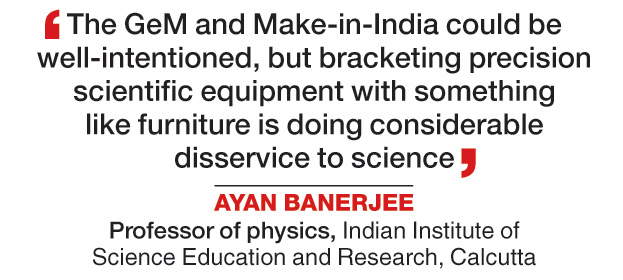The Narendra Modi government’s Make-in-India campaign and e-marketplace initiative have stirred frustration among scientists who say these measures facilitate the supply of poor quality equipment and threaten to hobble the country’s research efforts.
The Make-in-India campaign embedded in the Government-e-marketplace (GeM), a portal for online procurement, appears to have ignored the realities of India’s ability to manufacture research equipment, scientists from top academic institutions say.
The Union commerce and industry ministry has set up the GeM for the procurement of products and services by central and state government departments and public-funded academic and autonomous institutions.
The GeM requires sellers to specify the country of origin or local content, if any, of their products and accords priority to products with more than 50 per cent local content. This is meant to promote Make-in-India, a campaign launched in September 2014 to foster innovation and help turn India into a hub of manufacturing, design and innovation.
“The GeM and Make-in-India could be well-intentioned, but bracketing precision scientific equipment with something like furniture is doing considerable disservice to science,” said Ayan Banerjee, a professor of physics at the Indian Institute of Science Education and Research, Calcutta.
Anecdotes shared across scientific circles, some scientists said, indicate trouble with even everyday equipment amid what they suspect are inadequate quality checks.
At the Indian Institute of Technology, Bombay, a minus 80°C refrigerator procured through the GeM stopped functioning within months, a faculty member said. At an academic institution in eastern India, a scientist said, a biological safety cabinet for cell culture studies and a water bath to incubate biological samples at constant temperatures — both bought through the GeM — malfunctioned.
Transactions on the GeM have ballooned with the gross merchandise value rising from Rs 38,000 crore in 2020-21 to more than Rs 106,000 crore in 2021-22. The GeM facilitated over 3.3 million transactions in 2021-22, an eight-fold growth since 2017-18, its first year.

The commerce ministry has credited the portal with enhancing transparency, efficiency and public cost-savings while driving inclusion by increasing market access to micro and small medium enterprises, women’s self-help groups and start-ups.
India’s Economic Survey for 2021-22 had noted that prices on the GeM were on an average 9.5 per cent lower compared with Amazon or Flipkart. And 10 out of 22 sampled products were cheaper on the GeM than on other platforms.
It is unclear whether the malfunctioning refrigerator, biological cabinet and water bath were aberrations among millions of transactions on the GeM, but anecdotal accounts have prompted some scientists to voice concern.
“Precision is everything in scientific research. Even an error of 0.1 per cent is sometimes a disaster for scientific data,” Santosh Chauhan, a senior biologist at the Institute of Life Sciences, Bhubaneswar, posted on Twitter in July.
In a series of tweets, Chauhan urged the Centre to rethink the policy of imposing Make-in-India on the scientific community, expressing concern that the current rules threaten to compromise research by forcing scientists to procure low-quality Indian-made products.
Chauhan, among other scientists, declined to discuss these concerns with The Telegraph, saying institutional policies prevent them from airing such concerns. One scientist said that “even genuine criticism is now likely to be viewed as anti-government”, explaining the request for anonymity.
An email query sent by this newspaper to the GeM’s chief executive officer, seeking responses to the concerns about quality expressed by some scientists, remains unanswered.
Scientists are worried that equipment trouble could delay progress in competitive research landscapes as they scramble for replacements.
Abhijit Majumder, associate professor of chemical engineering at IIT Bombay, last week procured a serological pipette controller, also called a pipette gun, a handheld mechanical device used in chemical labs that uses a vacuum to transfer small amounts of liquid.
Majumder’s students found that it leaked — the vacuum seal was imperfect.
“It cost only Rs 6,000, but we now don’t have a pipette gun, our experiments have stalled, and we need to go through extra drama with the supplier for a replacement,” Majumder said.
The supplier had asked Majumder to send a video of the failed pipette gun before agreeing to replace it.
Anecdotal accounts of equipment makeup suggest that some manufacturers procure components from other countries, “possibly China, assemble them locally, claim more than 50 per cent local content, and get priority on the GeM”, a senior scientist said.
Scientists believe a phased expansion of the Make-in-India campaign would have helped.
“We have manufacturing strengths in some areas and gaps in others,” Majumder said. “We should have started with the strength areas and waited for manufacturing expertise to build up in the others.”
Banerjee, the IISER Calcutta scientist who uses lasers as “optical tweezers” to manipulate microscopic particles, for instance, has always bought sturdy optical tables — which shouldn’t move a fraction of a millimetre during experiments — from a Delhi-based company.
“The optical tables cost 2 lakh to 5 lakh rupees and are as good as those we could get from abroad for 5 lakh to 15 lakh rupees,” Banerjee said. “I have never imported optical tables.”
Although the GeM has provisions for complaints and product replacements, scientists say they find the process vexing.
“Sometimes, no one comes to repair or replace the failed equipment. Some sellers don’t seem to have a reputation they want to preserve,” a scientist said.











